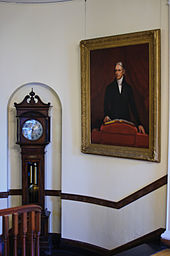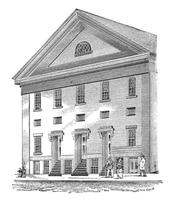Hosea Ballou

Hosea Ballou (born April 30, 1771 in Richmond , New Hampshire Colony , † June 7, 1852 in Boston ) was an American theologian and author . Ballou is seen as one of the defining figures of early North American universalism .
Live and act
Ballou was born in 1771, the eleventh child of Maturin and Lydia Ballou, in Richmond , New Hampshire . His family had Huguenot - Norman roots. His father was a preacher in a Calvinist influenced Baptist church . His mother Lydia died when he was only two years old. Like his father, Ballou saw himself as a Baptist in his youth. That changed, however, when Ballou attended sermons given by the universalist preacher Caleb Rich . In 1789 Ballou finally converted to universalism and between 1801 and 1817 was active as a preacher in various locations in the Central Atlantic states , including Portsmouth in New Hampshire (1807 to 1815) and Salem in Massachusetts (1815 to 1817). In 1817 he was pastor of the second universalist church in Boston ( Second Universalist Church ), where he served until his death in 1852.
In addition to his theological work, Ballou was also active as a journalist. He founded and edited, among others, The Universalist Magazine (from 1819) and The Universalist Expositor (from 1831, later renamed The Universalist Quarterly Review ). He wrote over 10,000 sermons and composed a number of hymns, essays, and polemical theological writings. His book A Treatise on Atonement (German: A Treatise on Atonement ), in which he represented anti-Trinitarian - Unitarian positions, exerted great influence on the universalist movement even years later. Ballou is also often referred to along with John Murray as a co-founder of American universalism. Unlike Murray, Ballou was anti-Calvinist oriented and rejected both legalistic and Trinitarian ideas, which earned him the description as an ultra-universalist. Ballou was married to Ruth Washburn, one of his children (Maturin Murray Ballou) later worked as a well-known newspaper publisher.
Web links
- CV Hosea Ballous on the Unitarian Universalist Association website
- CV Hosea Ballous on the Princeton University website
Individual evidence
- ↑ Auburn.edu: A short Essay on Universalism (by Hosea Ballou)
- ^ Catholicism.org: Hosea Ballou - Son of Richmond - Father of Universalism
| personal data | |
|---|---|
| SURNAME | Ballou, Hosea |
| BRIEF DESCRIPTION | American theologian and author |
| DATE OF BIRTH | April 30, 1771 |
| PLACE OF BIRTH | Richmond , New Hampshire |
| DATE OF DEATH | June 7, 1852 |
| Place of death | Boston |
